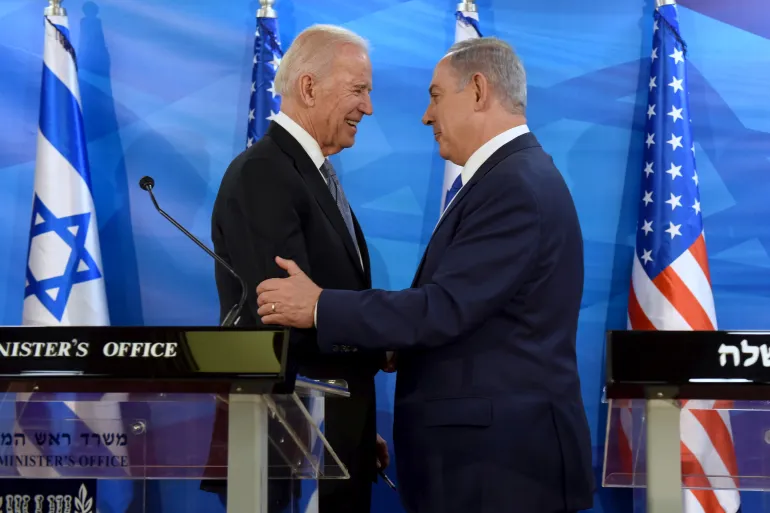With Israel attacking Gaza for a second week, United States President Joe Biden and his administration are sticking to a long-established script in Washington, expressing unequivocal support for Israel and its “legitimate right to defend itself” from Hamas rocket attacks.
That narrative fails to acknowledge the profound advantages the state of Israel enjoys over the Palestinians when it comes to military prowess, wealth and resources. It also turns a deaf ear to growing cries from progressive Democrats in Congress to take a harder line with Israel over its military assault on Gaza.
This latest escalation in violence has killed at least 213 Palestinians, including 61 children, while ten Israelis have died, including two children,
So why is the US so unwavering in its support for Israel?
When did the US start supporting Israel?
From the beginning. Former US President Harry Truman was the first world leader to recognise Israel when it was created in 1948.
Why was Truman so quick to do that?
In part because of personal ties. Truman’s former business partner, Edward Jacobson, played a pivotal role in laying the groundwork for the US in recognising Israel as a state. But there were also strategic considerations driving the decision.
What were the strategic stakes at the time?
This was right after World War II, when the Cold War between the US and the Soviet Union was taking shape.
The Middle East, with its oil reserves and strategic waterways (think the Suez Canal) was a key battleground for superpower hegemonic influence. The US was taking over from severely weakened European powers as the primary western power broker in the Middle East.
But even then, support for Israel was not unequivocal.
So when did it become unequivocal?
That is partly rooted in the aftermath 1967 war in which Israel defeated the poorly led armies of Egypt, Syria and Jordan and occupied the rest of historical Palestine – as well as some territory from Syria and Egypt.
Since then, the US has acted unequivocally to support Israel’s military superiority in the region and to prevent hostile acts against it by Arab nations.
Were there other developments that played a role?
There was also the 1973 war that ended with Israel defeating Egyptian and Syrian forces.
Partly to drive a wedge between Egypt and Syria and thwart Soviet influence, the US used the aftermath of the 1973 war to lay the groundwork for a peace deal between Israel and Egypt that was eventually cemented in 1979.
Has that influenced US aid to Israel?
You bet. Israel is the largest cumulative recipient of US foreign aid in the post-World War II era.
In 2016, then-President Barack Obama signed a defence agreement with Israel providing $38bn in US military support over 10 years including funding for the Iron Dome missile defence system.
Bear in mind, Israel is not exactly in need of aid. It is a high-income country with a thriving high-tech sector.
Is this all just about practical geostrategic stuff?
Like all things foreign policy-related, public opinion, money – and the influence money buys in politics – have also played a role in US policy towards Israel and the Palestinians.
What role has public opinion played?
American public opinion has long tilted in favour of Israel and against the Palestinians, in part because Israel had a superior PR machine. But headline-grabbing, violent actions by pro-Palestinian groups such as the 1972 Munich Massacre in which 11 Israeli Olympic athletes were killed also generated sympathy for Israel.
Has that sympathy wavered at all?
More Americans are warming to the Palestinian cause, according to an annual survey conducted by Gallup.
The February poll found that 25 percent of Americans sympathise more with Palestinians – a 2-percentage-point increase over the previous year and a full six percentage points higher than 2018.
Favourable ratings for the Palestinian Authority also hit a new high of 30 percent – a 7-percentage-point improvement over 2020.
But Israel still holds far more sway in the court of US public opinion.
That same Gallup poll found that 58 percent of Americans sympathise more with Israel, while 75 percent of Americans rate Israel favourably.
Source : Aljazeera















